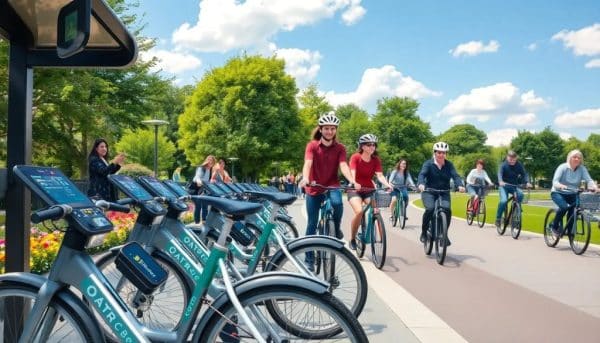The landscape of urban mobility in the UK is evolving rapidly, especially with the rise of bike hire schemes and electric bikes. This article explores the future of smart bike hire in the UK, delving into various developments and innovations. Through advancements in technology and sustainability, cities are reimagining how residents and tourists navigate urban spaces.
In this exploration, we will review the latest developments in bike hire schemes, advancements in specific cities like Edinburgh and Cardiff, as well as the impact of e-scooter initiatives on urban mobility.
What are the latest developments in bike hire schemes across the UK?
Across the UK, bike hire schemes are being revitalized to meet the growing demand for sustainable transport options. The introduction of electric bikes has provided users with the ease of covering longer distances without exerting much effort, which appeals to both commuters and recreational riders.
Many cities are also experimenting with dockless bike hire systems, which allow users to pick up and drop off bikes anywhere within designated areas. This flexibility enhances the overall user experience and encourages the adoption of cycling as a viable transportation mode.
- Integration of GPS tracking to minimize theft.
- Increased partnerships between local councils and private companies.
- Focus on user-friendly apps to streamline the hiring process.
Moreover, the emphasis on sustainability has led to the introduction of initiatives that promote the use of bicycles over cars, thereby reducing traffic congestion and lowering carbon emissions. This shift aligns with broader goals of improving air quality and promoting healthy lifestyles.
How is Edinburgh advancing its bike sharing initiatives?
The City of Edinburgh Council is set to reintroduce a bike-sharing scheme in collaboration with Voi Technology. This initiative aims to address previous challenges such as vandalism and high operational costs, leveraging lessons learned from earlier attempts.
Starting on September 3, this trial will feature 50 electric bikes that utilize a dockless system, making them available to users throughout the city. The goal is to attract both visitors and local commuters, enhancing the appeal of cycling as a practical transportation option.
Key features of the new scheme include:
- Improved bike design to reduce maintenance costs.
- Comprehensive user education programs focusing on responsible usage.
- Enhanced safety measures, including better bike parking facilities.
The emphasis on collaboration between public authorities and private enterprises is crucial for the success of these schemes. By engaging with the community and stakeholders, Edinburgh is fostering a supportive environment for innovative transport solutions.
What innovations are being introduced in Cardiff’s electric bike hire scheme?
Cardiff is making significant strides in its bike hire initiatives by launching a fully-funded electric bike scheme set to debut in spring 2026. This scheme will incorporate cutting-edge technology designed to minimize theft and vandalism, an issue that has plagued many bike-sharing programs in the past.
The introduction of GPS-enabled bikes is a notable innovation that allows for real-time tracking and monitoring. This feature not only enhances security but also provides valuable data to improve the service continually.
Some anticipated benefits include:
- Reduction of operational costs through efficient bike management.
- Enhanced user experience with easy access to bike availability.
- Promotion of eco-friendly transportation options in urban areas.
As the city prepares for this launch, ongoing community engagement and feedback will be vital in tailoring the service to meet the needs of residents and visitors alike. The scheme's design emphasizes both accessibility and sustainability, reinforcing Cardiff's commitment to becoming a leader in urban mobility.
How are e-scooter initiatives impacting urban mobility?
The rise of e-scooter initiatives has transformed the urban landscape, complementing existing bike hire schemes. Cities are recognizing the potential of micro-mobility options to alleviate congestion and provide flexible transport solutions.
By integrating e-scooters into public transport systems, cities can offer seamless connections between various modes of transportation, enhancing overall accessibility. Users can easily transition from public transit to e-scooters or bikes, creating a cohesive travel experience.
However, the expansion of e-scooter initiatives is not without challenges. Some concerns include:
- Safety regulations for both riders and pedestrians.
- Infrastructure development to accommodate increased usage.
- Addressing public concerns regarding clutter and road sharing.
Despite these challenges, the potential benefits of e-scooters in promoting sustainable transportation cannot be overlooked. As cities refine their policies and regulations, the integration of e-scooters could play a pivotal role in shaping the future of urban mobility.
What challenges are bike and e-scooter schemes facing in the West Midlands?
The West Midlands is currently expanding its bike and e-scooter sharing scheme, aiming for a model that relies less on public subsidies. This shift comes with several challenges, particularly in ensuring safety and sustainability.
One major concern is the need to establish robust infrastructure to support increased bike and e-scooter usage. This includes dedicated bike lanes and parking facilities to accommodate the growing number of users.
Additionally, addressing safety concerns is paramount. As the popularity of e-scooters and bike-sharing grows, it is essential to implement regulations that protect both riders and pedestrians. Some of these measures may include:
- Enhanced rider education programs.
- Collaboration with local authorities to improve road safety.
- Regular maintenance checks on shared vehicles to ensure safety standards.
The West Midlands’ approach reflects a broader trend of cities looking to balance innovation with public safety and environmental responsibilities. As these schemes evolve, continuous assessment and adaptation will be necessary to meet the demands of urban mobility.
How are technology and sustainability shaping the future of cycling?
Technology plays a crucial role in shaping the future of cycling, particularly in urban areas. Innovations in bike hire systems, such as app-based rental services and advanced tracking systems, are making cycling more accessible and user-friendly.
Moreover, sustainability is at the forefront of these advancements. Cities are increasingly recognizing the need for sustainable transport options that reduce emissions and promote healthier lifestyles. The integration of electric bikes into existing schemes aligns with this vision, encouraging a shift away from car dependency.
Some emerging trends that showcase this shift include:
- Development of smart bike hire systems that utilize AI for predictive maintenance.
- Increased investment in cycling infrastructure, such as dedicated lanes and bike parks.
- Community initiatives promoting cycling as a primary mode of transport.
By harnessing technology and embracing sustainability, cities across the UK are paving the way for a future where cycling is an integral component of urban mobility. The commitment to ongoing innovation will only enhance the user experience, making cycling not just an option, but the preferred choice for many.
Frequently asked questions about smart bike hire in the UK
What is the electric bike scheme UK?
The electric bike scheme in the UK refers to various initiatives launched by cities to promote the use of electric bikes as a sustainable transport option. These schemes often include features like GPS tracking, ease of access through user-friendly apps, and partnerships with private firms to enhance service quality. The aim is to provide a convenient alternative to cars, especially in urban areas.
What is the future of the bike industry?
The future of the bike industry looks promising, with an increasing emphasis on sustainability and technology. Innovations like electric bikes, smart hire systems, and infrastructure investment are expected to drive growth. As more cities adopt bike-sharing schemes, the industry will likely see a shift towards a more integrated and user-centric approach.
How much is a Boris bike to hire?
The cost of hiring a Boris bike, officially known as the Santander Cycles, is generally around £2 for a 24-hour period, allowing for an unlimited number of journeys within that timeframe. Additional charges apply for rides exceeding 30 minutes. This pricing structure aims to encourage short-term rentals and promote cycling as an accessible transport option in London.
How many bicycles are there in the UK?
As of recent estimates, there are approximately 1.5 million bicycles available for hire across various schemes in the UK. This number continues to grow as cities expand their bike-sharing initiatives, reflecting an increasing interest in cycling as a sustainable mode of transport.


Leave a Reply